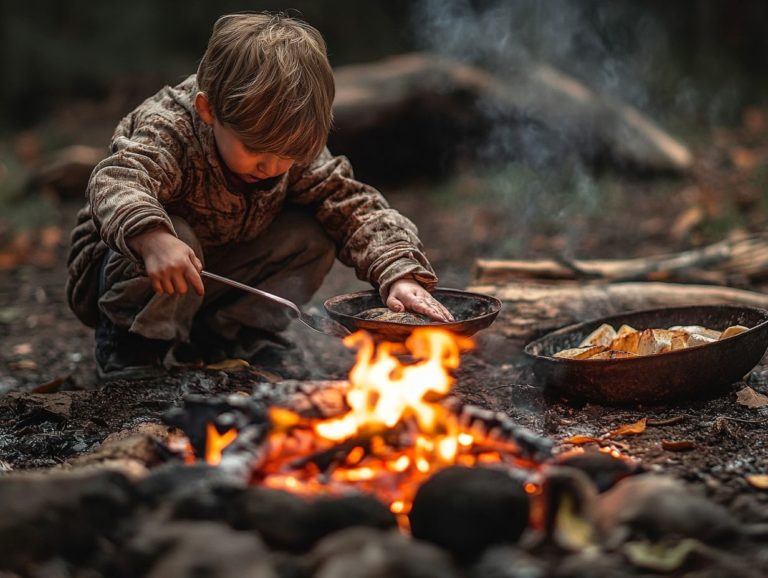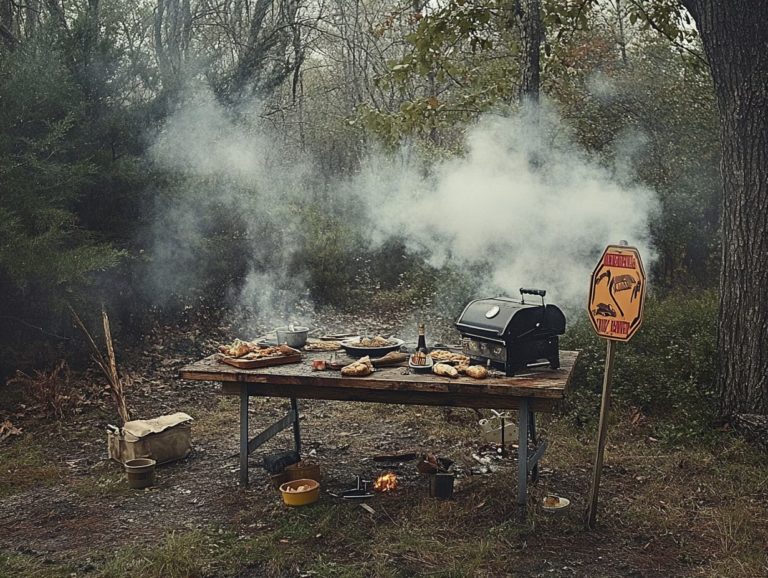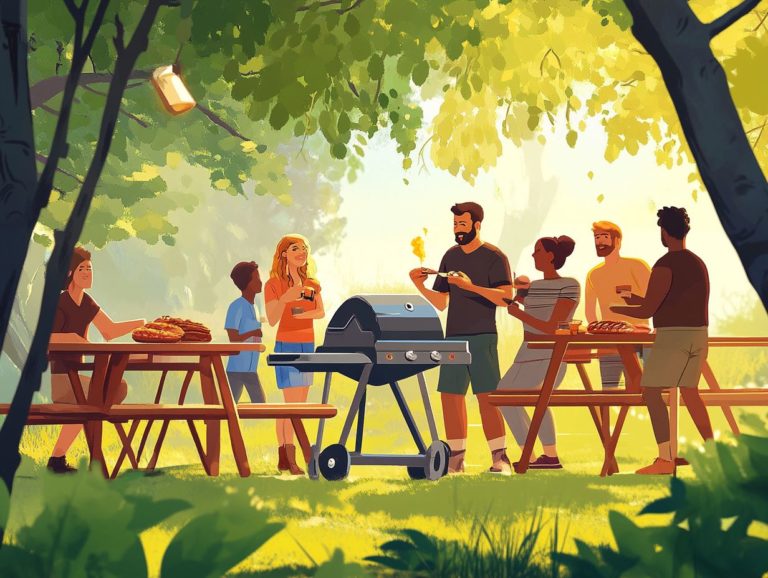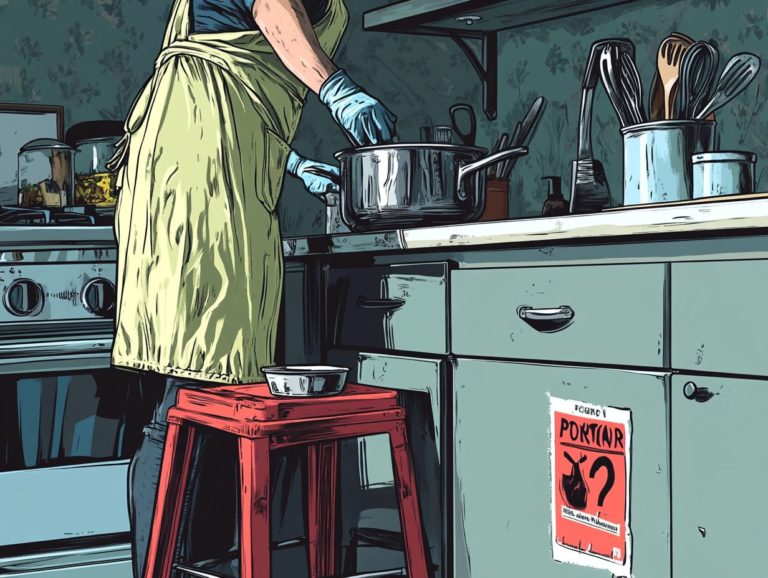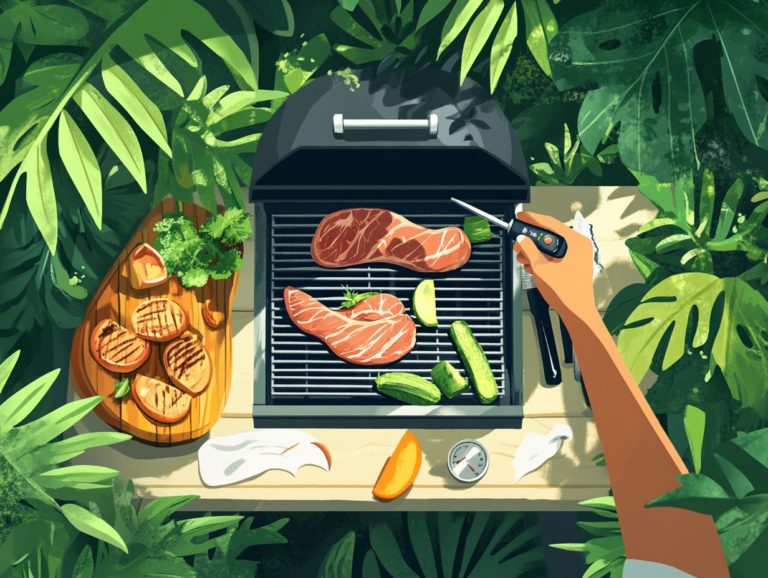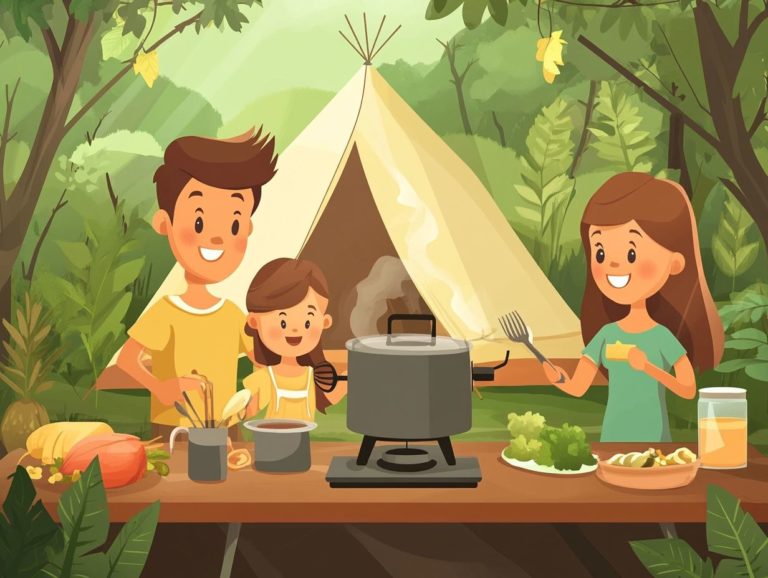5 Essential Checks Before Outdoor Cooking
Planning an outdoor cooking adventure is an exhilarating endeavor, but meticulous preparation is essential to ensure everything unfolds seamlessly. By following some expert outdoor cooking tips, you can take your cooking experience to the next level. Get ready to impress your friends and family with memorable meals shared under the stars!
From verifying the weather forecast to confirming you have ample fuel, each step is pivotal to your success. This guide outlines 15 essential checks designed to enhance your outdoor cooking experience, ensuring it remains both enjoyable and safe while being mindful of the environment and local regulations. With proper BBQ safety measures, you can avoid common grilling accidents.
Prepare to indulge in delightful meals beneath the open sky with these insightful tips at your fingertips! Whether you’re trying a new recipe or using a Dutch oven (a heavy pot that’s great for cooking outdoors), these cooking outdoors tips will enhance your meal prep.
Contents
- Key Takeaways:
- 1. Check the Weather Forecast
- 2. Make Sure You Have Enough Fuel
- 3. Clean and Prepare Your Grill or Fire Pit
- 4. Check for Any Fire Restrictions
- 5. Prepare and Marinate Your Food Ahead of Time
- 6. Have the Necessary Tools and Utensils
- 7. Check for Any Food Allergies or Dietary Restrictions
- 8. Keep a Fire Extinguisher or Water Source Nearby
- 9. Plan for Proper Food Storage and Leftovers
- 10. Have a Backup Plan in Case of Bad Weather
- 11. Check for Any Local Regulations or Permits
- 12. Consider the Environment and Leave No Trace
- 13. Make Sure You Have Enough Clean Water
- 14. Check for Proper Lighting and Safety Measures
- 15. Get Excited Have Fun Cooking Outdoors!
- What Are the Benefits of Outdoor Cooking?
- Frequently Asked Questions
- What are the 5 essential checks before outdoor cooking?
- Why is it important to check the weather before outdoor cooking?
- How should I inspect my equipment before outdoor cooking?
- What should I do to prepare my cooking area before outdoor cooking?
- Do I need any safety gear for outdoor cooking?
- How can I ensure proper food storage and handling during outdoor cooking?
Key Takeaways:
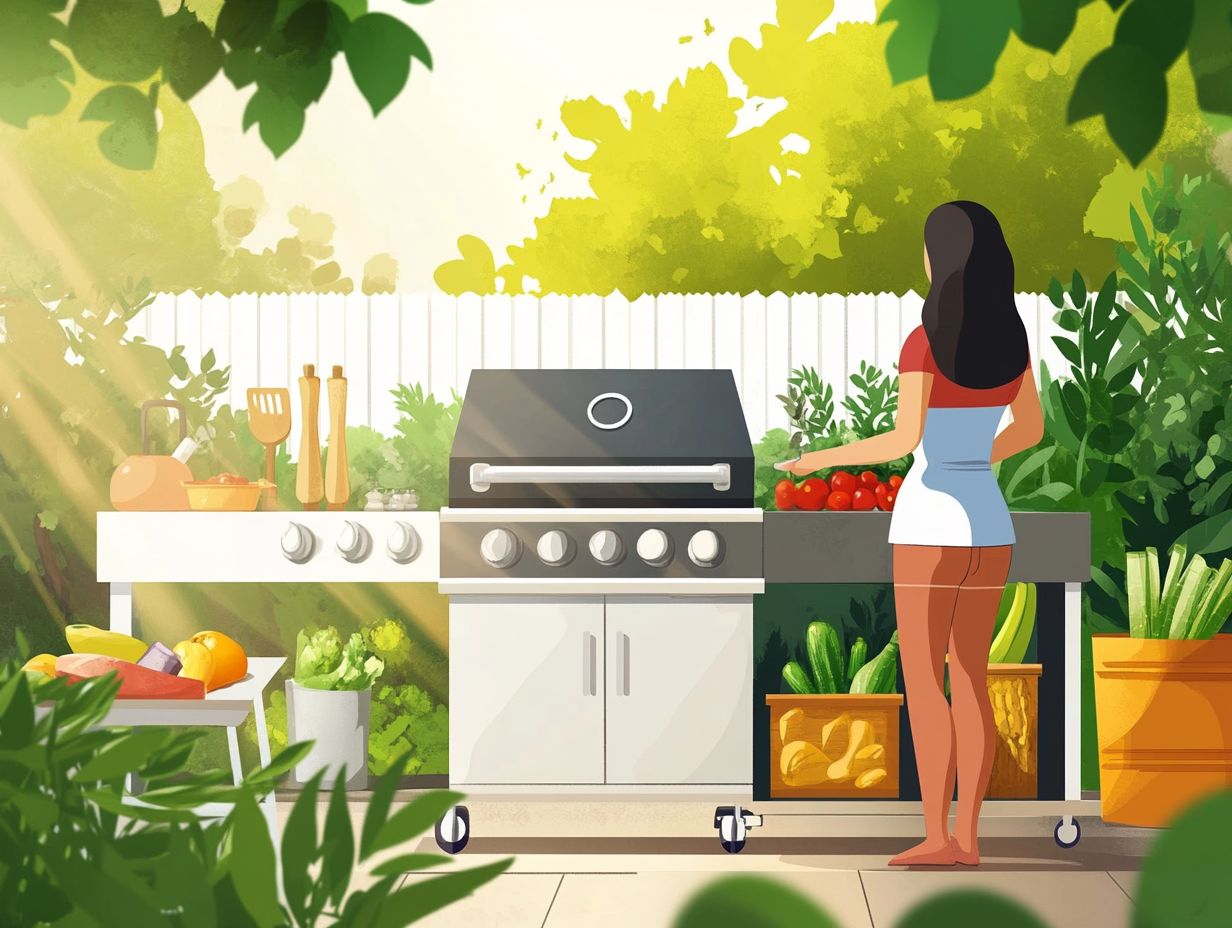
1. Check the Weather Forecast
Before you dive into your outdoor cooking adventure, checking the weather is a must! Ensure that your cooking gear is suitable for the conditions. This little step ensures that your cooking experience remains both safe and enjoyable. To enhance your safety, refer to these 5 essential safety tips for outdoor cooking groups. Elements like rain, wind, and temperature can greatly influence your outdoor plans. Being informed allows you to prepare adequately, whether you’re grilling up a feast or using a Dutch oven to create delicious outdoor recipes.
The right conditions can transform your summer BBQ into a memorable gathering for family and friends while minimizing any potential cooking challenges.
Understanding how various weather conditions impact your culinary endeavors is crucial. For example, high winds can sap heat from your grill. A sudden downpour may require a backup plan like moving the cooking indoors or finding a sheltered area.
When the temperatures drop, controlling heat becomes vital; food may take longer to cook, necessitating adjustments in your cooking time. Be ready to adapt your methods perhaps using heavier pots to retain heat or planning for higher cooking temperatures on chilly days.
Regardless of the weather, having the right gear such as a sturdy canopy or heating elements can elevate your experience. This way, you ll enjoy the food preparation process whether it s a calm, sunny day or a breezy afternoon.
2. Make Sure You Have Enough Fuel
Having sufficient fuel is paramount for your outdoor cooking endeavors, whether you’re working with charcoal, propane, or a trusty cast iron grill. Additionally, having the right essential safety gear for outdoor cooking, like a fire extinguisher, is vital for safe cooking outdoors. Running low on fuel can lead to undercooked meals, compromising both the quality of your food and increasing the risk of foodborne illness.
It’s important to recognize that each cooking method demands specific fuels; for example, charcoal excels at grilling thanks to its remarkable heat retention, making it perfect for summer BBQs, while propane provides the ultimate convenience and portability for quick heat. For using a Dutch oven, hardwood or charcoal briquettes are often the go-to choice for even heat distribution.
Storing your fuel safely is crucial keep it in a cool, dry spot, away from direct sunlight and any potential heat sources. For portable fuels, securing them in specialized containers helps prevent leaks or spills.
Plan ahead for managing fuel during outdoor events. Think about estimating how much you’ll need based on cooking times and prepare extra just in case those unanticipated flare-ups say hello!
3. Clean and Prepare Your Grill or Fire Pit
Cleaning and preparing your grill or fire pit is key for a successful outdoor cooking experience. Regular kitchen hygiene practices help avoid cooking accidents and keep your cooking process safe and hygienic.
By using BBQ safety tips like removing grease and food residues you enhance the flavor of your meals and minimize the risk of grilling accidents and food contamination. A well-maintained cooking area boosts your outdoor culinary adventures and promotes excellent kitchen hygiene.
When cleaning various types of grills gas, charcoal, or electric start by disconnecting the fuel source and clearing out any leftover charcoal or ash. For gas grills, scrub the burners and check for any blockages; this step is crucial.
Fire pits require emptying ash and debris, followed by a gentle wipe-down of the exterior with an appropriate cleaner. Keep your cooking area clutter-free and regularly sanitize your utensils.
Manage your fire properly. By controlling the flames effectively, you ensure even cooking and reduce the risk of flare-ups, creating a safe and enjoyable cooking environment.
4. Check for Any Fire Restrictions
Before you fire up the grill, check for any local fire restrictions, especially during the dry summer months when wildfire risks increase. Knowing these regulations guarantees your safety and protects the environment, allowing you to enjoy a worry-free BBQ experience at places like Maple Grove Hot Springs.
Adhering to fire safety guidelines helps avoid grilling accidents. To find this vital information, visit local government websites, fire departments, or community bulletin boards, which keep you updated on fire restrictions.
Understanding fire safety is critical during outdoor events. For example, during extreme weather conditions, certain areas may ban open flames, including charcoal grills and campfires, affecting your meal preparation. Ignoring these guidelines can lead to fines and increased fire hazards for everyone who cherishes nature.
Staying informed is crucial; don t let an oversight ruin your BBQ plans! You can fully embrace your passion for cooking while respecting nature and ensuring a safe experience for all involved.
5. Prepare and Marinate Your Food Ahead of Time
Preparing and marinating your food ahead of time can elevate your outdoor cooking experience, enhancing flavors while keeping meal prep efficient and stress-free. Proper cooking methods enhance food quality.
Opt for recipes that allow for marination for delectable outcomes, whether grilling meats or crafting delightful outdoor dishes all while following BBQ safety standards to minimize the risks of foodborne illnesses.
For instance, marinate meats like chicken or steak for a few hours or overnight to soak up flavor and tenderness. Vegetables typically need less time around 30 minutes to an hour will do the trick.
To maintain a safe cooking environment, prepare your marinade in a clean bowl and avoid cross-contamination by using separate utensils for raw and cooked items.
Popular outdoor recipes, such as grilled kebabs and marinated veggies, showcase the convenience of advance preparation, making the grilling process smoother and more enjoyable for everyone.
6. Have the Necessary Tools and Utensils
Having the right tools and utensils is absolutely crucial for your success in outdoor cooking. They streamline food preparation and make your grilling skills shine.
From essential gear like spatulas and tongs to specialized equipment such as a Dutch oven, the right tools can transform your outdoor cooking experience and help you manage the process with ease.
Consider investing in a reliable grill thermometer. This little gem allows for precise temperature control, ensuring your meats are cooked to perfection no more worrying about undercooking or drying them out.
A sturdy grill brush is essential; it keeps your cooking surface clean and prevents unwanted flavors in your dishes.
Don t overlook the importance of quality heat-resistant gloves. They are a crucial part of grilling safety to protect against burns while flipping food or adjusting the grill.
Each of these tools plays a vital role in making outdoor cooking not just safer but also more enjoyable for family gatherings. This ensures that every bite is a moment to savor without a hint of worry.
7. Check for Any Food Allergies or Dietary Restrictions
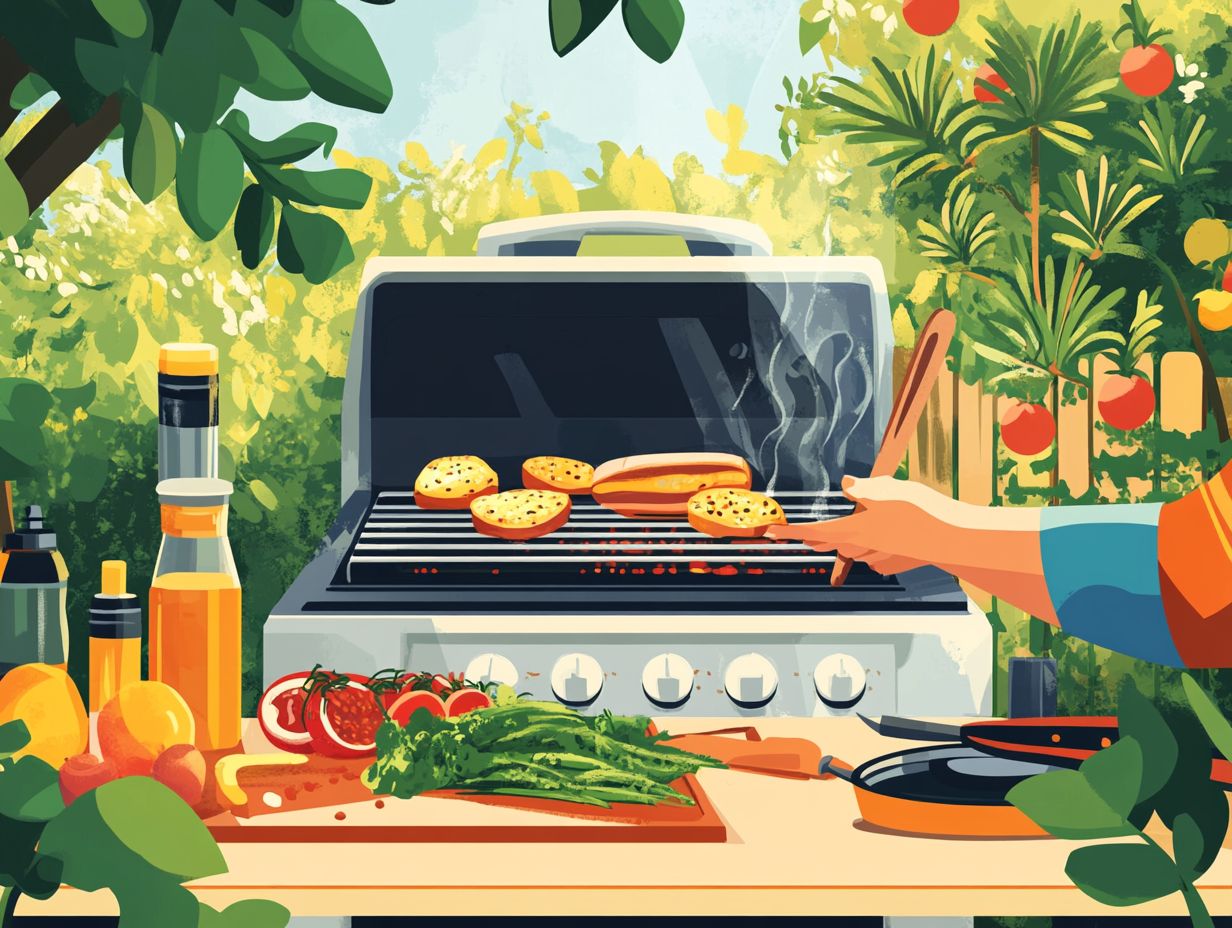
When planning your outdoor cooking, it s essential to consider any food allergies or dietary restrictions among your guests. Be proactive and check for allergies before you cook!
This thoughtful approach not only elevates the quality of the food but also fosters inclusivity during family gatherings, allowing you to craft delicious meals that everyone can relish without compromising their health.
Common food allergies, such as nuts, dairy, gluten, and seafood, should be on your radar. Recognizing these can profoundly influence your recipe planning.
For instance, if gluten is a concern, you might opt for almond or coconut flour as substitutes, ensuring your dishes remain delectable, especially when using outdoor cooking recipes.
If dairy is off the table, consider using coconut milk or almond milk to achieve that creamy texture without the lactose.
You could also explore aquafaba, the liquid from canned chickpeas that can be used instead of eggs, as an egg replacer in various recipes.
By making these thoughtful substitutions, you can keep the cooking experience vibrant and flavorful. This accommodates everyone s dietary needs while cultivating a warm, welcoming atmosphere for your gathering.
8. Keep a Fire Extinguisher or Water Source Nearby
Safety should always take center stage when you’re cooking outdoors. That’s why it’s essential to have a fire extinguisher or a reliable water source close at hand, just in case an emergency arises. Additionally, following 5 ways to ensure clean cooking surfaces outdoors can further enhance your cooking safety.
This level of preparedness helps you stay one step ahead of fire risks, transforming your cooking experience into a more relaxed and enjoyable affair while minimizing the chances of any grilling mishaps.
Regarding selecting fire extinguishers for outdoor cooking, you might want to consider options like Class B extinguishers. These are capable of handling flammable liquids, which you ll likely encounter in many outdoor setups.
If you re dealing with cooking oils and fats, Class K extinguishers are specifically designed for those scenarios, ensuring a swift and effective response to grease fires.
Understanding fire management practices is crucial. This includes keeping your cooking area clear, being mindful of wind conditions, and having contingency plans ready for any unexpected flare-ups.
By familiarizing yourself with how to respond to various emergency situations like quickly dousing flames with a fire extinguisher or safely removing a burning object from the grill you can significantly enhance your safety and that of those around you.
9. Plan for Proper Food Storage and Leftovers
Proper food storage and management of leftovers are essential for outdoor cooking. They help prevent foodborne illnesses and ensure your meals maintain quality. Mastering safe storage lets you fully enjoy outdoor cooking without worrying about spoilage.
Keep raw meats separate from vegetables and other perishables to avoid cross-contamination. Use insulated coolers for perishable items, and include ice packs to keep everything at optimal temperatures. For cooked dishes, store them in airtight containers to lock in freshness and flavor. Remember to refrigerate leftovers promptly.
As you plan meals for camping adventures, prioritize non-perishable items or consider pre-cooking and freezing dishes that can be easily thawed. Always check the expiration dates on your food items and safely dispose of any uneaten food to minimize wildlife attraction and uphold hygiene.
10. Have a Backup Plan in Case of Bad Weather
Planning a backup strategy for inclement weather is crucial for outdoor cooking, especially during summer BBQs or events. This preparation allows you to tackle any challenges, ensuring your culinary experience remains enjoyable even if the skies misbehave.
Indoor cooking alternatives, like a stovetop or oven, can be lifesavers. They let you transition seamlessly from outdoor grilling to indoor preparations without missing a beat.
Consider portable shelters, such as pop-up canopies, which offer an instant solution to unexpected rain, keeping your guests dry while enjoying the celebration.
Flexibility in meal planning is important; opt for dishes that can be prepared both indoors and outdoors. This facilitates a smooth shift in response to weather surprises.
With these strategies in place, you can guarantee a delightful cooking experience, no matter what curveballs Mother Nature throws your way.
11. Check for Any Local Regulations or Permits
Before diving into outdoor cooking, check local regulations or permits that might be necessary, especially if you re grilling in public spaces like Maple Grove Hot Springs. Understanding these guidelines keeps you compliant with the law and promotes fire safety and environmental stewardship.
Research specific local ordinances to identify required permissions, such as permits for grilling in designated picnic areas or restrictions on open flames in certain parks. It s wise to consult the local government website or contact the parks and recreation department for comprehensive information.
By following these regulations, you protect yourself and fellow outdoor enthusiasts from potential hazards and contribute to the sustainable enjoyment of nature’s spaces. Being well-informed enhances your cooking experience and fosters respect for both the community and the environment.
12. Consider the Environment and Leave No Trace
Make it a priority to protect the environment every little effort counts! Embrace Leave No Trace principles to minimize your impact on nature. Practicing fire safety and maintaining a clean cooking space enhances your outdoor culinary experiences while preserving the pristine beauty of your favorite locations.
Use reusable containers for your meals and pack out all trash, including food scraps. When managing fires, use a designated fire ring or a portable stove to prevent new fire pits and protect the landscape from damage.
Opt for biodegradable soap when cleaning your pots and pans to keep harmful chemicals out of the ecosystem. Practice these tips to enjoy eco-friendly outdoor cooking. Are you ready to make your outdoor cooking unforgettable while caring for the environment?
13. Make Sure You Have Enough Clean Water
Ample clean water is essential for outdoor cooking. It s vital for food prep and hygiene.
Water is not just necessary for cooking; it s also crucial for cleaning your equipment and hands. This helps fend off foodborne illnesses and creates a safe cooking environment.
In various outdoor settings, finding clean water can be a challenge. Bring a portable water filter or purification tablets, which make water safe to drink, to ensure you have safe drinking water. When setting up camp, choose locations near fresh water sources, ensuring they are upstream from waste disposal areas.
Water conservation is key. While boiling water for cooking is efficient, always remember to save some for cleaning up after the meal. By focusing on these practices, you can uphold high hygiene standards and ensure delightful and safe outdoor cooking experiences.
14. Check for Proper Lighting and Safety Measures
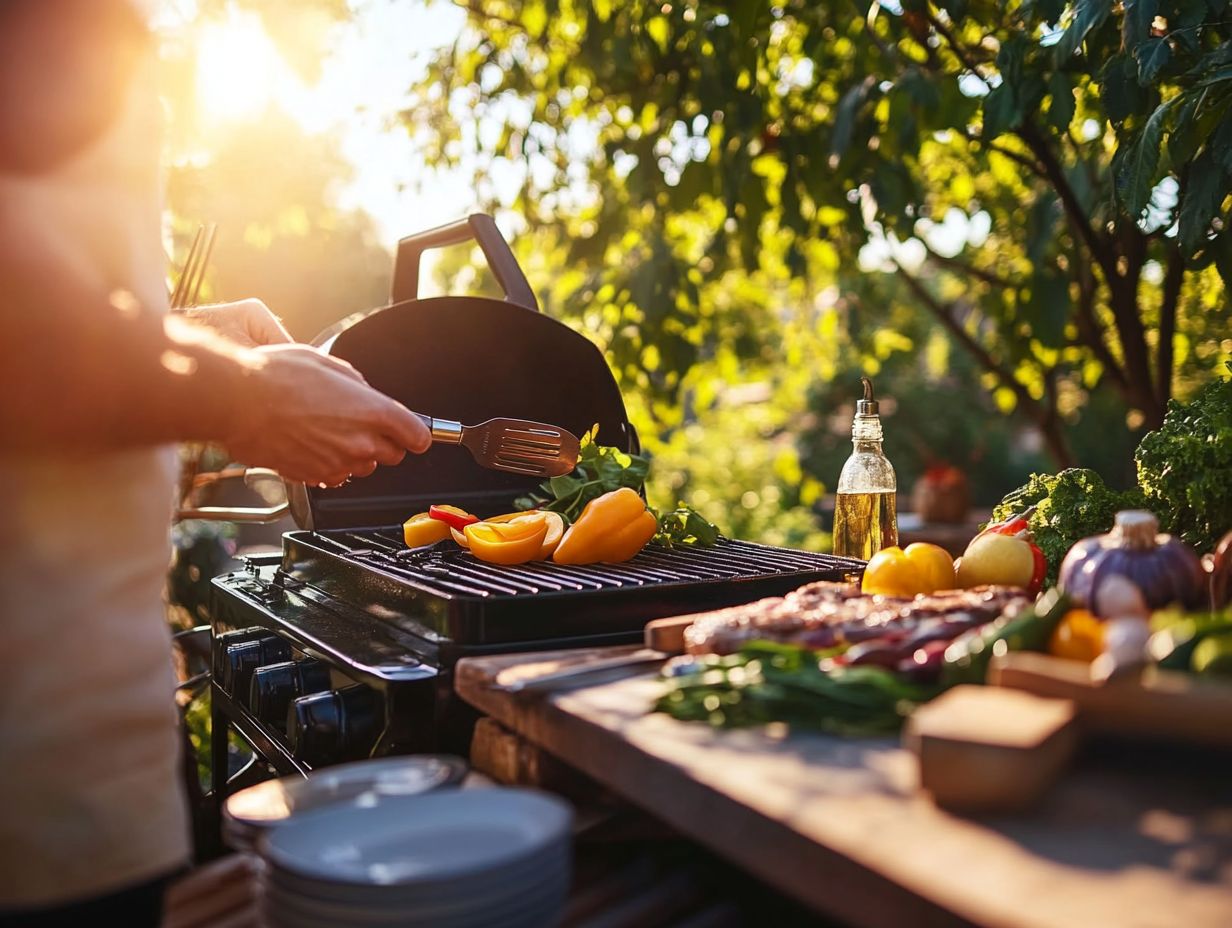
Proper lighting and safety measures are crucial when it comes to outdoor cooking, especially during evening gatherings or in dimly lit conditions. Adequate visibility boosts grilling safety and helps manage fire safety effectively, reducing the risk of accidents.
As you plan your outdoor cooking experience, think about various lighting options that can enhance both the atmosphere and functionality of your space. Portable lights and lanterns can illuminate your cooking area and pathways, helping to prevent trips or falls.
Effective lighting helps you see when your food is perfectly charred and keeps your equipment organized, making the cooking process smoother and more enjoyable.
15. Get Excited Have Fun Cooking Outdoors!
Outdoor cooking is all about indulging in fun and enjoying nature while crafting lasting memories with family and friends. By embracing outdoor cooking tips and prioritizing enjoyment, you can transform any gathering into a delightful cooking experience that celebrates nature and companionship.
Incorporate games like cornhole or frisbee to keep energy high. A well-curated playlist can elevate the atmosphere, setting a vibrant backdrop for your culinary creations.
Host themed cooking nights think Taco Tuesday or pizza parties where everyone can join in the preparation process. This fosters camaraderie and sparks creativity. Group cooking gives everyone a chance to showcase their culinary skills while encouraging laughter and conversation, making moments around the grill genuinely unforgettable.
What Are the Benefits of Outdoor Cooking?
Outdoor cooking presents a wealth of benefits that enhance your culinary experience and enjoyment of food, creating opportunities for cherished family gatherings. The fresh air and natural ambiance, combined with the mouthwatering flavors of outdoor cooking, foster connections and cultivate lasting memories.
Cooking outside encourages healthier eating habits by inspiring the use of fresh ingredients and seasonal produce. The physical activity involved in meal preparation, paired with gathering around a fire or grill, contributes to your well-being and camaraderie.
It s a wonderful way to engage family members of all ages. Invite everyone to partake in the cooking process and showcase their culinary creativity. Together, you ll uncover new recipes while strengthening your bonds and reveling in the beauty of nature.
How Can You Make Outdoor Cooking Safe and Enjoyable?
To ensure your outdoor cooking experience is safe and fun, weave fire safety and proper cooking techniques into your planning. Follow grilling safety guidelines to minimize risks and maximize the pleasure of outdoor meals with friends.
Choosing the right equipment is key; opt for a grill with safety features, such as a heat-resistant handle and adequate ventilation. This can significantly enhance your experience.
Proper food preparation is vital. Make it a habit to clean surfaces thoroughly and keep raw ingredients separate to prevent cross-contamination.
Before you fire up the grill, have a well-stocked first aid kit nearby. Knowing how to extinguish accidental flames will give you peace of mind.
Familiarize yourself with the area’s fire regulations by following 5 tips for safe fire pit cooking. This ensures you can enjoy a safe and responsible outdoor cooking experience.
What Are Some Common Mistakes to Avoid When Cooking Outdoors?
Outdoor cooking can be delightful, but common mistakes can lead to accidents and compromise BBQ safety. To ensure you’re well-prepared, check out essential tips for outdoor cooking to understand these pitfalls and elevate your culinary adventures, making every outdoor meal safe and delicious.
Watch out for improper food storage. When perishable foods aren’t kept at safe temperatures, you risk foodborne illnesses. Always use coolers and keep meats below 40 F until you re ready to cook.
Inadequate preparation techniques can also dampen your experience. Neglecting to marinate or season your food often results in bland meals. Take time to prep your ingredients for better flavors and an enjoyable cooking process.
Implement safety measures by keeping a fire extinguisher nearby and ensuring proper ventilation. For additional guidance, learn how to recognize unsafe cooking conditions outdoors. This allows you to focus on creativity and enjoy cooking outdoors.
How Can You Make Outdoor Cooking More Sustainable?
To make outdoor cooking more sustainable, consider the environmental impact of your methods and follow basic rules for protecting nature. Choose eco-friendly cooking ingredients and manage waste effectively.
Striking a balance between enjoyment and environmental responsibility is essential. Choosing organic ingredients supports local farmers and prevents harmful chemicals from affecting the ecosystem.
Elevate your sustainability game by composting scraps and using reusable utensils. Embrace renewable resources, like solar-powered cookers or biodegradable fuels, for a more conscious approach to meal prep.
What Are Some Delicious Recipes to Try for Outdoor Cooking?
When you venture into outdoor cooking, a world of delightful recipes awaits. These can elevate your summer BBQ or family gathering into an unforgettable culinary journey. From classic staples to innovative creations, the options are limitless.
Whether you re searing meats over an open flame or experimenting with unique ingredients like smoked herbs and fruits, outdoor cooking offers remarkable versatility. Grilling techniques can cater to various dietary preferences, from hearty meats to vibrant vegetarian dishes.
Why stick to the usual burgers and hot dogs? Try grilled veggie skewers marinated in zesty chimichurri or even a pizza cooked right on the grill. These recipes elevate flavors and create an inviting atmosphere for your gathering.
Get out there and fire up the grill! Your next culinary adventure awaits.
Frequently Asked Questions
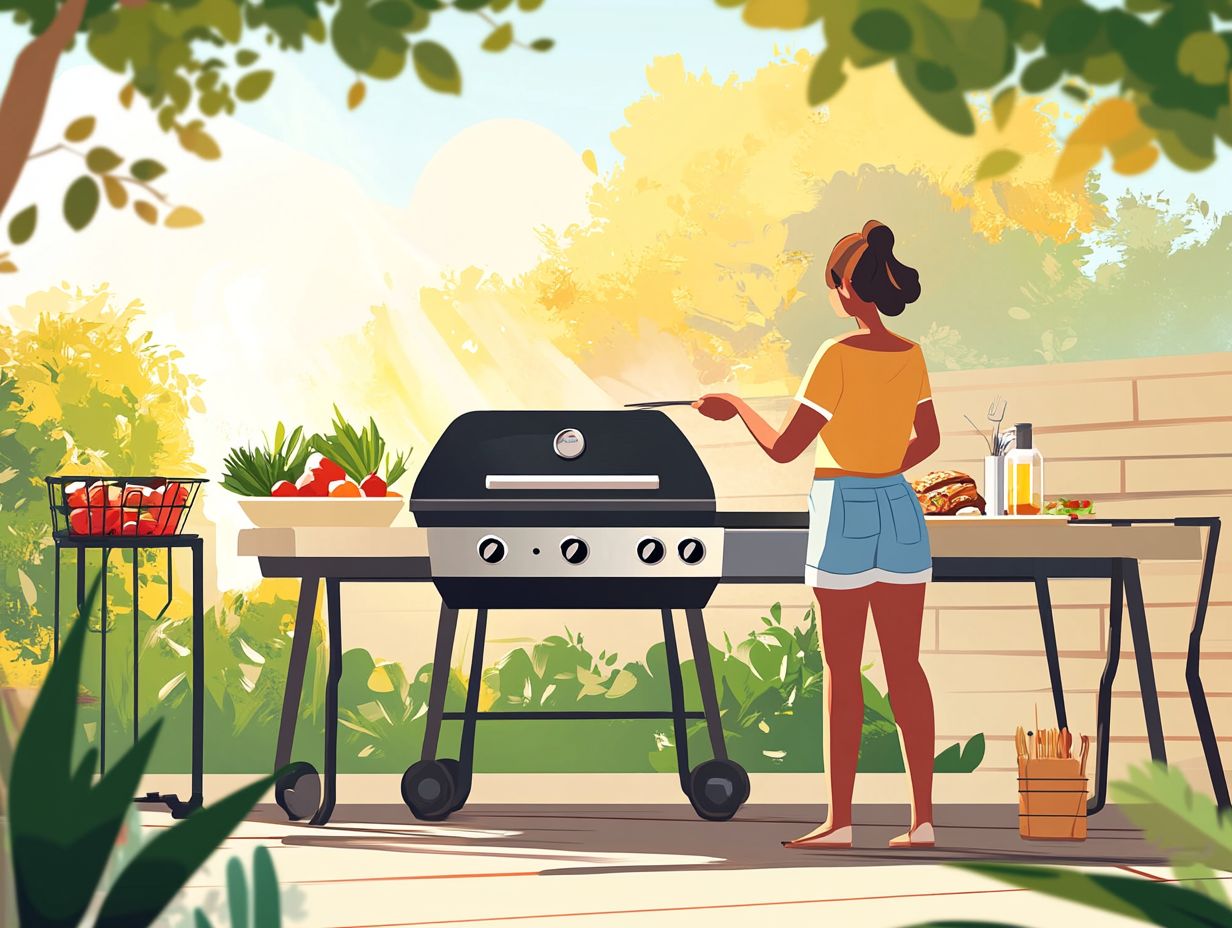
What are the 5 essential checks before outdoor cooking?
Before outdoor cooking, check the weather. Also, inspect your tools, prepare your cooking area, have necessary safety gear, and consider using 5 must-have safety tools for outdoor cooking to keep food safe.
Why is it important to check the weather before outdoor cooking?
Checking the weather before outdoor cooking is essential. It can greatly affect your cooking experience, as extreme conditions like strong winds or heavy rain can make it difficult and unsafe. Additionally, following 5 ways to ensure safe cleanup after outdoor cooking helps maintain safety and organization.
How should I inspect my equipment before outdoor cooking?
To inspect your tools, ensure all parts are in good working condition. Check for damages, clean them thoroughly, and you ll be ready to cook safely.
What should I do to prepare my cooking area before outdoor cooking?
Clear your cooking area of debris and potential hazards. Ensure proper ventilation for gas-powered tools, and keep a fire extinguisher nearby for safety.
Do I need any safety gear for outdoor cooking?
Don t forget to grab your safety gear for a fun and safe cooking adventure! Heat-resistant gloves, an apron, and long-handled tools are essential to avoid burns and accidents.
How can I ensure proper food storage and handling during outdoor cooking?
To keep food safe, store perishable items in a cooler with ice packs. Use separate cutting boards and utensils for raw and cooked foods, and always wash your hands before and after handling food.

